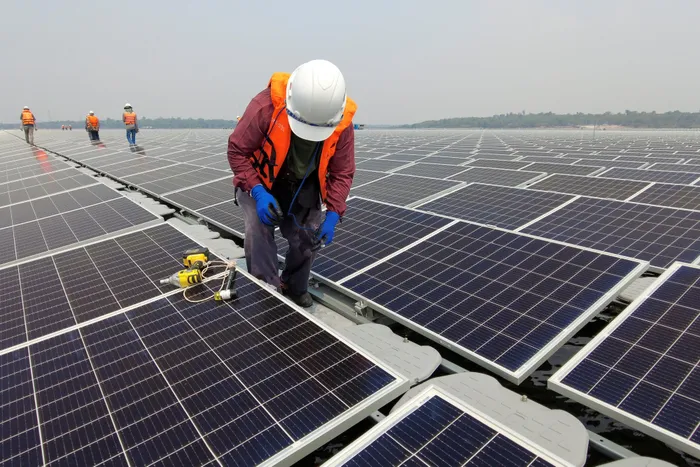PIC–Oxford research shows green investments can create 70 000 jobs annually in SA
INVESTMENT

The study finds that South Africa is emerging as one of the continent’s most competitive markets for green investment, with institutional-grade pipelines in renewable energy, grid modernisation, water infrastructure, circular manufacturing and early-stage green technologies such as green hydrogen.
Image: REUTERS/Prapan Chankaew
The Public Investment Corporation (PIC) has released groundbreaking new research showing that Africa-focused green investments can outperform global benchmarks while generating significantly more jobs and long-term economic value than traditional sectors.
The paper titled "Scaling Institutional Capital for Green Jobs in South Africa" was developed in collaboration with the University of Oxford and published on Monday ahead of the G20 Leadership Summit.
It forms part of the PIC’s Perspectives: G20 Dialogues series and is the fourth such research contribution this year.
With the right policy environment and coordinated public-private action, the paper argues, South Africa can position itself as a continental leader in green finance, job creation and industrialisation while delivering competitive returns for long-term investors.
The study finds that South Africa is emerging as one of the continent’s most competitive markets for green investment, with institutional-grade pipelines in renewable energy, grid modernisation, water infrastructure, circular manufacturing and early-stage green technologies such as green hydrogen.
Despite global economic headwinds, these projects offer resilient, inflation-linked cash flows and strong risk-adjusted returns.
According to the researchers, Africa-focused renewable infrastructure funds recorded a higher Residual Value to Paid-In Capital (RVPI) ratio than the Americas, Europe, and global averages between 2015 and 2022, a strong indication of value growth and performance across the cycle.
The paper argues that green investments create up to 60% more jobs per rand spent and 140% more long-term economic value than traditional sectors.
With supportive policy and investment mobilisation, South Africa could generate more than 70 000 new green jobs annually and nearly 250 000 jobs by 2030, tripling current climate investment levels.
South Africa’s policy reforms over the past three years, including the Electricity Regulation Amendment Act, streamlined permitting, and the Energy One Stop Shop, have helped convert concepts into investable projects.
But the researchers warn that structural constraints remain, particularly grid capacity bottlenecks, skills shortages, and uneven industrial readiness.
They recommend accelerated permitting, predictable procurement pipelines, improved coordination among regulators, and targeted credit guarantees to unlock large-scale private capital.
The National Treasury is already developing such a guarantee mechanism to support transmission infrastructure, with the deputy minister of finance and chair of the PIC, Dr David Masondo, projecting a market launch in July 2026.
Credit guarantees provide a form of insurance to de-risk long-term investment into economic infrastructure, Dr. Masondo explained.
South Africa’s renewable energy programme, the Renewable Energy Independent Power Producer Procurement Programme (REIPPPP), remains a central pillar of green job creation. To date, the programme has secured more than 6GW of renewable energy capacity.
PIC-backed projects across wind, solar and hydro technologies have enabled more than 4 000 jobs and supported over 1 800MW of installed capacity to date.
Many of these investments were made during the earliest bid windows, when the renewable sector was still nascent. PIC’s early involvement helped de-risk projects, crowd in additional investors and build the foundation for a thriving renewable industry.
In total, the PIC has invested more than $300 million in debt and $100m in equity in renewable projects, while deploying over R2.5 billion in socio-economic development (SED) and R764 million in enterprise development (ED) contributions in host communities through the REIPPPP.
The Presidential Climate Commission estimates that annual climate finance in South Africa has tripled since 2017/18, signalling growing momentum behind the country’s green transition.
Looking ahead, the PIC said it continues to broaden its portfolio into emerging technologies such as green hydrogen, hydrogen fuel-cell systems, sustainable sanitation, long-duration energy storage, and next-generation grid and charging infrastructure.
It has committed more than $100m to hydrogen technologies and recently pledged $17m to the SA-H2 Fund’s equity tranche.
The research paper stresses that scaling up green investment is not merely an environmental priority, but an economic necessity.
South Africa’s energy and transport sectors already contribute more than R860 billion in annual economic value, and both must expand rapidly to support population growth and industrialisation.
To conclude its G20 research series, the PIC will host an in-person dialogue on Thursday with global sovereign wealth funds, development finance institutions and private asset managers.
Led by Masondo and PIC CEO, Patrick Dlamini, the gathering aims to develop a framework agreement for accelerating global investment flows into Africa.
BUSINESS REPORT